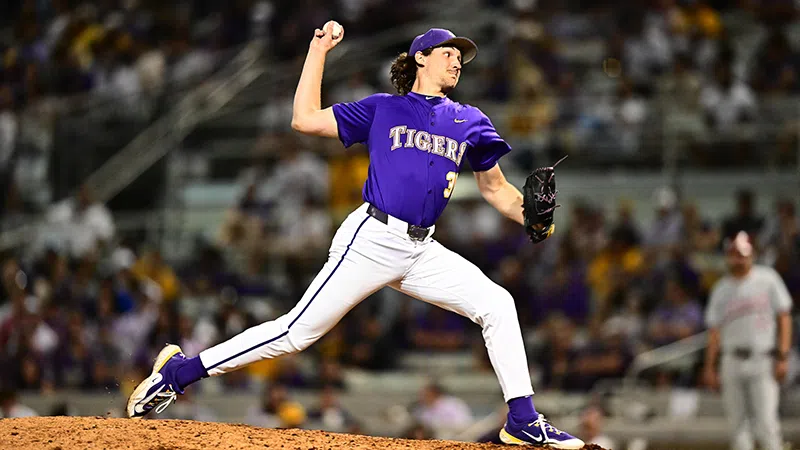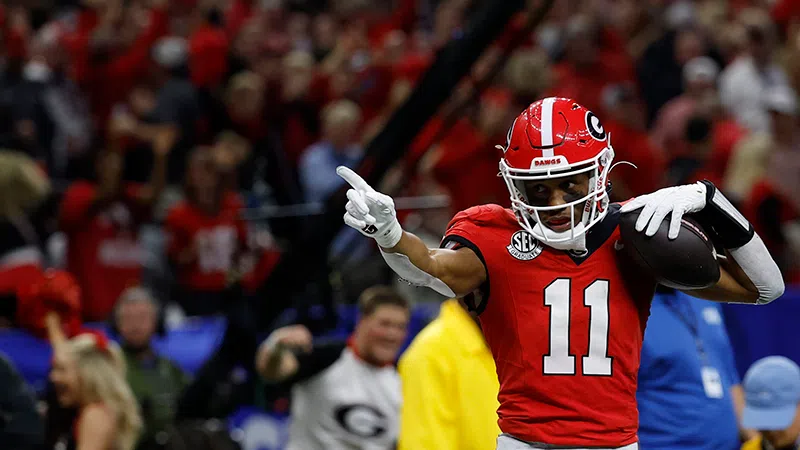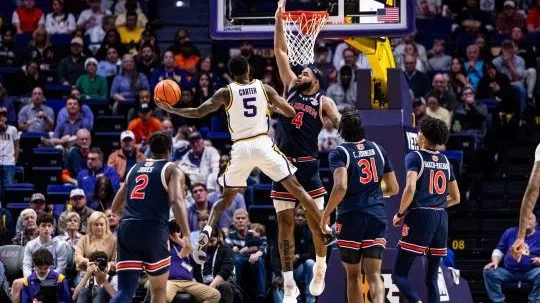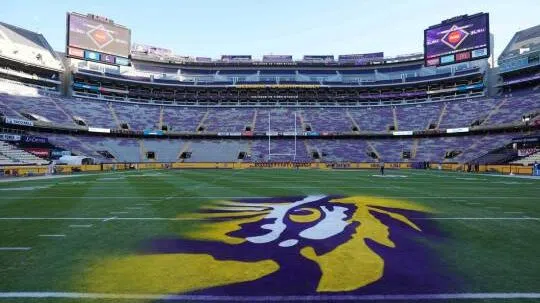
LSU Athletics
By Hunt Palmer
While the MLB Draft creates stress on an elite college baseball program, it also creates joy.
Jay Johnson doesn’t have to sweat Kade Anderson’s decision on Sunday night. He might be the first pick. That comes with a price tag just north of $11 million.
Insider Joe Doyle anticipates that’s what is headed Anderson’s way.
“With the firing of (General Manager) Mike Rizzo, I think, if you’re the scouting director there, if you’re in charge of making sure that you make an impact right away,” doyle said. “You probably want the college pitcher that is going to move quickly, that is polished, has pitched in big moments, that is going to help contribute to a winning culture sooner rather than later in the Washington Nationals organization. You couple that with the fact that Nationals need pitching. Their farm system needs pitching, and they need high minors pitching, so I think Anderson’s going to be a phenomenal fit in Washington, and I think if you look at what they’ve done with MacKenzie Gore, Kade Anderson is not too terribly different.”
Gore, another southpaw, has pitched to a 3.02 ERA this season with 138 strikeouts in 110.2 innings. He has emerged as the Nationals’ ace. Could Anderson join him at the front of the rotation soon?
“It depends on what you define as front of the rotation,” Doyle said. “I have him as a No. 2 starter, maybe on the lower end of a No. 2 starter. I think he’s similar to some of the things that Jon Lester did in the prime of his career. I don’t know if anyone would have ever called Jon Lester at any point an ace, just a bulldog. Now he was a phenomenal arm, don’t get me wrong, and absolutely key to some World Series-winning title teams, but at the end of the day I think Kade Anderson probably slots in as a No. 2 when he’s fully developed.”
Anderson’s decision is made for him.
Other Tigers will have to consider all options, signing a sizeable check or returning to school for another chase at a championship.
Among those with a decision to make is towering fireballer Chase Shores. Doyle sees both sides.
“I’ve said this for a couple of weeks now, LSU is trying to keep Chase Shores,” Doyle said. “They’re trying to keep him around, give him overtures of being a weekend guy. Chase doesn’t have a long and decorated baseball card at this point. He hasn’t pitched in the SEC or in college baseball for that matter at all. I think he does have a tough decision. It’s a body. It’s the stuff. It’s the arm talent that should get you picked in the top 25, top 30 picks in any given draft, but given his circumstances and what he’s gone through, I think he’s probably going to have to choose between taking $1.1, $1.2 maybe up to $1.5 million bucks or going back to Baton Rouge and trying to double that.”
A late second round pick generally signs for about $1.4 million. A pick in the middle of the first round can get north of $5 million.
Is that realistic for Shores in 2026?
“Without question,” Doyle said. “Chase Shores can come back and show that he lives 96-to-99 (mph) with a bowling ball sinker, 87 to 90 mph slider, it doesn’t even matter if he’s 22 (years old) at that point. Scouts will look at that and go, ‘even if we think that this kid is fully developed and not projectable, it’s already up to 101 mph with a wipeout slider.’ If he shows that he can come in and pitch long innings and throw strikes, I have no doubt, no question at all that he can still go in the top 25 top 20 picks in 2026.”
Shores is more likely than not to turn professional. A closer call may be Ethna Frey’s. After a .331 season with 13 home runs, he could be an early-round pick. He could also return as a cornerstone to the 2026 Tigers.
“I’ve talked to, actually, a few people over the last handful of days,” Doyle said. “I think Ethan Frey is a guy that is kind of starting to rise a little bit. As of a few weeks ago, it was fifth or sixth round because he hasn’t really played defense. Guys have seen him in a corner outfield. Guys have seen him at first base on a very abbreviated basis. But they really haven’t seen it over the course of an actual game setting in season. I’m starting to hear a little bit of late third, early fourth round for Ethan Frey, so I think there’s a chance that he can go pro. I have heard that he’s interested in going pro, but on the other side of the coin, I’ve also heard like the Chase Shores thing. LSU is working overtime to get Ethan Frey to return back to school. He is one of the more important pieces that LSU could lose in this draft, and at this point, three weeks ago I would have said there’s probably a 75, 80 percent chance that he’s going to be back in the purple and gold. Now, I think it’s more of a coin toss with Ethan Frey. It would be hard for him to walk away from the money in the third round that teams can offer him.”
Jacob Mayers is another intriguing case. He’s vanishing stuff and spotty control make a draft pick a gamble with high upside. Every anticipation is that Mayers will sign professionally, but when?
“We’ve seen Jacon Mayers unbelievable at times,” Doyle said. “When he’s in the zone, nobody hits him. Nobody can get base hits off of him. But when he’s not throwing strikes, the walks come in bunches. It’s unbelievable arm talent. It’s unbelievable fastball metrics. I think everybody would agree at this point that Jacob Mayers is probably at best like an eighth inning leverageable reliever. I’m just not sure is he a sixth rounder because somebody thinks they can straighten him out? Or is he 12th to 15th rounder? He’s a really difficult evaluation. The ceiling is obviously pretty exciting. The floor is a guy that kind of just gets stuck in Double-A. He’s one that I’m going to be watching on Sunday and Monday.”
(The quotes in this story come from Joe Doyle’s appearance on After Further Review with Matt Moscona)

More LSU Sports










